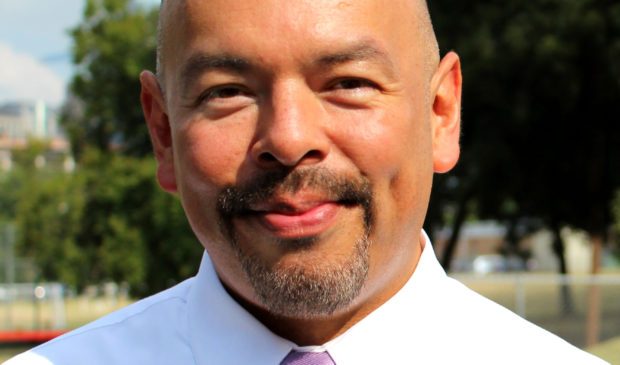AISD trustee reveals reasons behind resignation
Wednesday, April 12, 2017 by
Joseph Caterine In a sit-down interview with the Austin Monitor, Austin Independent School District Trustee Paul Saldaña opened up about the reasons behind his departure from the board, disclosing his fears of becoming bogged down in bureaucracy and describing a school district entangled in webs of distrust.
Saldaña officially announced his resignation at a press conference last Friday morning, with some speculating that his opposition to the board’s adoption of the Facility Master Plan update the Monday prior, which passed 6-3, drove him to leave. Saldaña told the Monitor it was more complicated than that. “It was a culmination of a lot of things,” he said. “I didn’t want to become complacent.”
Born in Austin and raised on the east side, Saldaña grew up next to the infamous Holly Power Plant and experienced the desegregation of AISD firsthand, being transferred to various schools 10 times before he graduated from high school. After working for the city in the 1990s, he eventually ascended to the role of chief of staff for Gus Garcia, the only Mexican-American mayor in the city’s history.
Outside of his professional career, Saldaña worked as a community activist, notably in terms of public education. In the late 2000s, he served as co-chair of the Community Committee for Neighborhoods and Schools, working alongside future Mayor Pro Tem Kathie Tovo. “One of the main themes of that committee’s final report was how do we inspire trust in the school district,” Saldaña said.
As with other public institutions, AISD has struggled to earn the confidence of its constituents, especially when it comes to its non-white communities. Unlike City Council, AISD has had district representation since the 1980s, although a couple of trustees are still elected at-large. Nevertheless, Saldaña said that this structure has not solved problems of representation. Since the time he was elected in December 2014, the board has only been through one cultural competency workshop session, which he said is not enough.
“For those of us that know the history of this city, it feels no better off than it was 40 years ago,” Saldaña said. “(Trustee Edmund Gordon) has said that he feels like the ‘token negro’ on the board, and sometimes I felt like the token Latino.”
Like some of his fellow trustees, Saldaña decided to run for the board after the controversial 2011 AISD Administrative Recommendation for a Facility Master Plan. As a member of the community, he had voiced criticism of then-superintendent Meria Carstarphen’s handling of that process. After joining the board, Saldaña said that he has sometimes felt that other trustees suspected him of putting his strong opinions before the wishes of his district.
Still, it is a fact that the majority of Austin’s public school students are black and brown, and Saldaña said that it should not only be the responsibility of the non-white board trustees to represent those kids. At the same time, he said that he does not blame the current board, who he considers family. “I applaud this board for having uncomfortable conversations about racism and segregation,” he said.
Instead, Saldaña said that it is ultimately the responsibility of Austin’s voters and community to change the narrative of an AISD plagued by mistrust and inequity. Next November, five board member positions will be up for reelection.
As for his own replacement, Saldaña said that he encourages his fellow trustees to appoint a District 6 representative as they did for District 7 in 2015 after Trustee Robert Schneider passed away, rather than holding a special election.
Saldaña’s last meeting will be April 24, where he plans to advocate for an equity perspective on historic bond dollar allocations.
“We talk a good game in this town of being progressive and liberal, but we are not in so many ways,” Saldaña said.
This story has been corrected to reflect the fact that the election is being held next November, not this upcoming Novemeber.
The Austin Monitor’s work is made possible by donations from the community. Though our reporting covers donors from time to time, we are careful to keep business and editorial efforts separate while maintaining transparency. A complete list of donors is available here, and our code of ethics is explained here.
You're a community leader
And we’re honored you look to us for serious, in-depth news. You know a strong community needs local and dedicated watchdog reporting. We’re here for you and that won’t change. Now will you take the powerful next step and support our nonprofit news organization?









